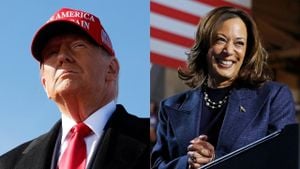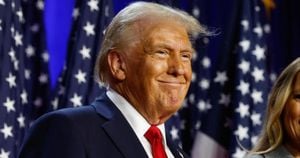Since the United Kingdom left the European Union (EU) back in 2020, the resulting chasm has presented many economic challenges for the nation. Recently, significant voices within the UK have underscored the urgent need to reconsider those ties, most prominently Bank of England Governor Andrew Bailey. Speaking at the Mansion House dinner, Bailey made it clear: it’s time for the UK to rebuild relations with the EU, as Brexit’s continued consequences weigh heavily on the economy.
Bailey did not take sides about whether Brexit was right or wrong but spotlighted the economic repercussions, particularly how the exit from the single market has contributed to trade issues. He noted the increased non-tariff barriers and customs checks taking a toll on businesses, especially smaller firms reliant on exports. This diplomatic pivot isn’t just political posturing; it reflects broader concerns echoed by business leaders throughout the UK.
While services exports have shown resilience, the same cannot be said for goods. The challenges of exporting to European countries have intensified post-Brexit, leading to calls from various sectors for closer cooperation with the EU. Bailey articulated this sentiment clearly: “We must be alert to and welcome opportunities to rebuild relations,” emphasizing the importance of trade links.
His comments come during turbulent economic times for the UK, coinciding with rising inflation pressures and precarious geopolitical conditions. Just days before Bailey's address, many were taken aback by the electoral victory of Donald Trump, which stirred anxiety over potential shifts in trade policies, particularly tariffs on imports. With UK businesses already struggling and many facing higher prices, there's no doubt economic strategies must adjust to these new realities.
The Labour Party, under Keir Starmer’s leadership, finds itself at the heart of this complex discussion. Although party leaders recognize the importance of strengthening ties with the EU, they’ve been cautious, hoping to avoid the pitfalls of past strategies. Starmer’s team has voiced support for limited changes such as mutual recognition of professional qualifications and easing veterinary checks except for fully rejoining the single market or customs union. This careful consideration aims to smoothen trade relationships without fully rolling back on Brexit commitments.
Stephen Moore, Donald Trump’s key economic adviser, offered stark advice to Starmer, warning against leaning too closely with the EU if the Labour government hoped to negotiate favorable trade terms with the United States. This precarious balancing act leaves Starmer pondering whether to align more with the EU, where most UK trade occurs, or to pursue relations with the US, known for its larger economic scale.
Such strategic angles bring to light Britain’s latest economic figures. Recent growth figures told a dire story: the economy grew by just 0.1% over the quarter, falling short of needed expectations. Starmer’s critics are quick to point out the risks of implementing policies too timid to encourage significant growth, especially under the pressure of stringent international trade conditions.
It’s not just about what the Labour government should or should not do; it’s also about the stark truths of the country’s economic performance. The Office for Budget Responsibility (OBR) has warned of disturbing consequences of Brexit, predicting long-term shrinkage of around 4% for the economy, with both imports and exports potentially seeing drops of 15%. Against the backdrop of potential tariffs from the US, these predictions raise urgent alarms for the British economy.
Adding complexity, Bailey and Starmer’s approaches could converge on the topic of improving business investment, finding routes to economic recovery. The Labour party has been called to ease regulations for financial services and adopt new strategies. It is widely understood among Labour members and even business leaders alike, the relationship with the EU remains pivotal for lifting stagnation and issuing opportunities for sustainable growth.
Bailey's clarion call for cooperation runs parallel with those from the Resolution Foundation, which has identified the effect of stagnant productivity growth as another pressing issue for the UK economy. Labour’s leadership recognizes the fine line they need to tread, as Parliament discusses new measures aimed at aligning with EU regulations—suggesting leaders see the merit of rekindling ties.
One area often touted for mutual benefit is the potential to establish agreements around food product regulations. Such alignment could mitigate checks and regulatory hurdles which the food supply chain has suffered since the UK exited the EU. This opens doors for both economic stability and trust-building between the UK and the EU.
Yet, the overarching sentiment remains: Labour has to arrive at firm resolutions amid this reshaped political environment. Voters expect their leaders to work toward improvements and transformation, which means contentious choices will must be made sooner rather than later. The party may need to abandon old reflexes of distancing themselves from Europe and aggressively seek deals, with focus on necessary negotiations
The UK’s existing trade reality is stark—taking steps forward to rebuild ties with the EU may potentially offer pathways toward economic resilience. Re-engaging this relationship denotes not merely good diplomacy, but also practical economic strategy; one they cannot afford to trivialize. Brexit was structured around the hope of independence, yet as Bailey suggests, it’s evident the future may heavily depend on collaboration with neighbors.
Starmer must engage both sides effectively, seeking opportunities for economic alignment with the EU as the balance with America is delicately managed. Britain’s economic future may well hinge on adeptly maneuvering these relationships, ensuring plans address the anxieties of businesses elicited by Brexit.



